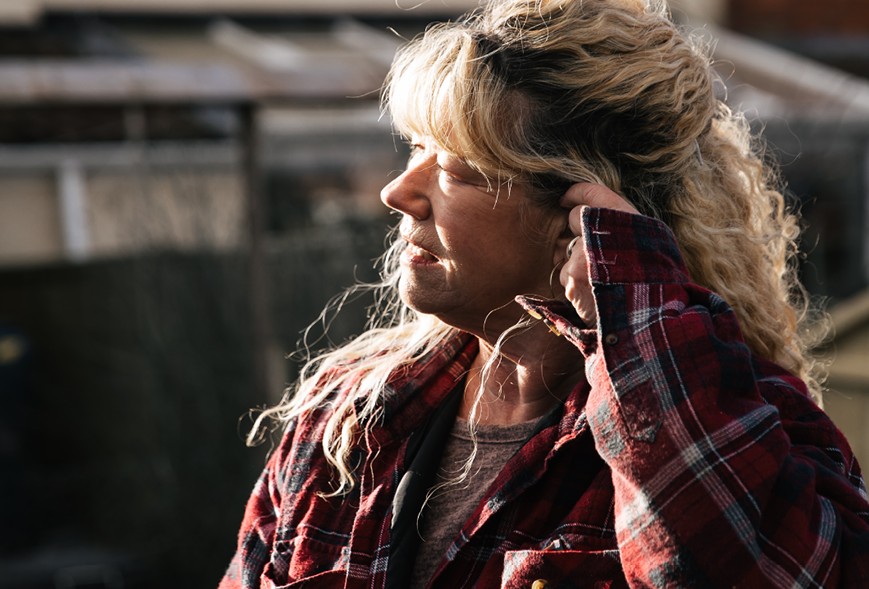
ADVICE + SUPPORT
Helping you to live well
Looking for posts about a specific condition? Choose here: Asthma | COPD | Smoking | Coronavirus | IPF | Bronchiectasis | Mesothelioma
Featured post
Most liked in Advice + Support
Damp is a common issue, especially in old houses or those in need of repair. Damp and mould can be a problem if you have a lung condition so fixing damp issues is important. Here’s what you can do about damp and mould if you live in a rented home.
Over the last few months we’ve been hearing from some of our supporters who have received unsolicited calls from individuals claiming to work for a loft insulation company or an “energy hub”. These have claimed to represent Asthma + Lung UK, or one of our legacy charities, British Lung Foundation. Paul, our Head of Supporter Care tells us more.
With GP practices getting busier, appointments can be hard to find. But those with lung conditions can take charge of their illness to make sure they are getting the right treatment and care. Dr Andy Whittamore, Clinical Lead at Asthma + Lung UK, gives his advice on how you can help manage your lung condition well.
Dr Andrew Whittamore looks at recent changes to reliever inhaler prescriptions and explains what they mean and how closer monitoring of reliver inhaler use can improve asthma management. He also gives his advice on what you can do to make sure you’re getting the full benefits of your medicines.
Making sure no one faces a lung condition alone
Having a lung condition brings questions and anxiety about the future.
We empower millions of people affected by lung disease by giving them the advice, knowledge and support to manage their condition.
Your support helps make sure no one faces lung disease alone. Please consider making a small donation today.
Advice + Support
Damp is a common issue, especially in old houses or those in need of repair. Damp and mould can be a problem if you have a lung condition so fixing damp issues is important. Here’s what you can do about damp and mould if you live in a rented home.
Over the last few months we’ve been hearing from some of our supporters who have received unsolicited calls from individuals claiming to work for a loft insulation company or an “energy hub”. These have claimed to represent Asthma + Lung UK, or one of our legacy charities, British Lung Foundation. Paul, our Head of Supporter Care tells us more.
With GP practices getting busier, appointments can be hard to find. But those with lung conditions can take charge of their illness to make sure they are getting the right treatment and care. Dr Andy Whittamore, Clinical Lead at Asthma + Lung UK, gives his advice on how you can help manage your lung condition well.
Dr Andrew Whittamore looks at recent changes to reliever inhaler prescriptions and explains what they mean and how closer monitoring of reliver inhaler use can improve asthma management. He also gives his advice on what you can do to make sure you’re getting the full benefits of your medicines.
Fatigue is very common with a lung condition. Tina has bronchiectasis and interstitial lung disease (ILD) and struggles with feeling tired on a daily basis. She’s found some excellent ways to help her cope and stay positive. In this blog, she shares her story and her advice for anyone else struggling with feelings of exhaustion.
Damp is a common issue, especially in old houses or those in need of repair. Damp and mould can be a problem if you have a lung condition so fixing damp issues is important. Here’s what you can do about damp and mould if you live in a rented home.
Winter can be challenging if you have a lung condition and it’s really important to look after both your physical and mental wellbeing. Here are Dr Andy’s top tips on keeping safe and well throughout the winter.
This winter, many organisations are setting up Warm Hubs. These are places where members of the public can go to keep warm. Working with experts in public health and lung disease, Asthma + Lung UK has produced guidance to help ensure that people running warm hubs can be confident that they are doing everything possible to make the environment safe.
It can be especially hard to deal with grief at Christmas, when everyone around you seems to be celebrating. Here are some tips on looking after yourself at this difficult time.
Living with a long-term lung condition can affect many aspects of your life. You’ll have physical symptoms, like getting out of breath and feeling tired. Lung conditions can also affect your mood, how you feel, and your ability to cope with daily life.
This World Mental Health Day, we’ve pulled together some tips to help you to look after your mental health right now.
Did you know that playing the harmonica can help you manage your breathlessness and learn great breathing techniques? In this blog, Adam, a Physiotherapy Lecturer at Brunel University London, explains his research alongside Chris, a lung health practitioner, into the benefits of harmonicas and chats about Asthma + Lung UK’s Harmonica For Lung Health sessions.
Have you ever wondered if asthma runs in families? This month’s myth busting looks at if asthma runs in families, and if you can get asthma without anyone in your family having it.
This month, we are busting the myth around breathlessness during physical activity being bad for your lungs.
If you're heading off to a festival this summer don't forget to pack your asthma inhalers as well as your wellies! You can’t always avoid asthma triggers like cigarette smoke and changing weather at festivals, but your asthma doesn’t have to stop you from having fun.
Jess from our Health advice team goes through the top 4 targets for all our health advice. She explains how we make sure our supporters are at the heart of everything we do and part of our fight to help everyone with a lung condition live well and breathe freely.
The fantastic pupils at Commonswood Primary School have been learning all about clean air this year and how important it is for safe breathing and keeping our lungs healthy. In this blog, Natasha from our Community Fundraising team explains how the school have been getting involved with our work.
In our in-house GP Dr Andy’s latest blog, he shares tips on keeping up doing the things that keep you well, even when you’re not in your normal routine.
In our in-house GP Dr Andy’s latest blog, he shares tips on keeping up doing the things that keep you well, even when you’re not in your normal routine.
Dr Andy Whittamore Clinical Lead at Asthma + Lung UK and a practising GP gives an update on how the rising cost of living is affecting people with lung conditions.
Andy explains what we’re calling for the government to do to help people with lung conditions and also outlines some of the support available and advice to stay well.
If not prescribed, using a nebuliser or oxygen therapy at home can be incredibly dangerous. This is because specialists monitor these types of treatments closely and adjust them to your individual needs.
In this blog, Suzanne, a Respiratory Nurse for our helpline, explains how you can access these treatments safely.
As we head into spring, the NHS is trying to not only get back to normal, but to catch up on waiting lists and more routine care. Over the last couple of years, we have seen a backlog develop because of staff absences and staff being transferred to other roles (to care for patients with COVID-19 and help roll out the vaccination programme, for example). In this blog, Dr Andy answers your questions about the impact of COVID-19 on lung health care.
This month our incredible A+LUK helpline celebrates 17 years since it began on the British Lung Foundation. Our Health Care Adviser Manager Carol has been here since the very beginning, and in this blog she shares her experience of working on the helpline.
Amanda our Long COVID project lead takes us through what we’ve learnt from Long COVID, and what we’re doing to help people living with their symptoms.
The New Year is a time for change and new beginnings, so why not resolve to manage your lung condition a little better? Kathy, a Respiratory Nurse for our Helpline, tells us how we can do this.
Are inhalers bad for the environment? The answer is not so straightforward. Our in-house GP, Dr Andy, talks us through all you need to know about greener inhalers.
Asthma UK and the British Lung Foundation have been part of lung health history for a long time! In this blog, Sophie from our Media team walks you through a short history of lung health and how our previous brands have made an impact.
Debby Waddell, Asthma + Lung UK Respiratory Nurse, shares tips on how to ask for an urgent appointment when your child needs one.

Every five minutes someone dies from a lung condition.
Yet only 2% of public funding for medical research goes to lung health. How can something so vital be so underfunded?
Together we can change this.

Visit our shop
From snoods and umbrellas, to mugs and keyrings, we have something for everyone. Each purchase made helps support our vital work.



























Amanda our Long COVID project lead takes us through what we’ve learnt from Long COVID, and what we’re doing to help people living with their symptoms.